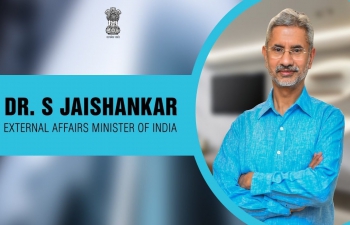Excellency Le Drian,
Excellency Heikomass,
Other distinguished Ministers,
Excellencies and friends.
Thank you for the invitation and the opportunity to speak at the Paris Peace Forum on issues pertaining to governance of the Cyberspace.
A starting point of our conversation has to be our shared understanding of cyberspace and digital technologies, which in my view, would include:
(i) A recognition that it has been a real force of economic, social, political, industrial, even behavioral transformation.
(ii) It operates in national boundaries but has a borderless nature.
(iii) Data is its new currency that powers new technologies and their uses.
(iv) Offers limitless opportunities but also exposes us to an uncharted territory of considerable challenges.
(v) May be a common good, but has spaces of contest and conflict within it.
Now, for a large developing country like India, digital domain and its technologies drive our democracy and development programmes; are central to effective and extended governance; and power our knowledge and innovation economy.
Four years ago, we launched the "Digital India?, the world?s largest, digital technology driven transformation programme. The central notion is that Digital infrastructure should be available as a utility to all citizens.
The world?s largest 1.2 billion strong biometrics based digital Unique ID programme; 1.2 billion mobile phone connections; 1 billion bank accounts; and over 500 million internet connections (and growing strongly) has created a massive matrix that converges growth with governance; and mainstreams allthe demographiesinto national development.
Algorithms are used to empower our women, the poor, farmers, youth, our unbanked and other marginalized sections of the society.
We are excited about the opportunities, but also concerned about the threats from the cyberspace.
There are actors, both state and non state, whose actions present a clear threat to our national, regional and global security.
One example is unimpeded growth of terrorism related activities, including extremist propaganda; terror financing; illicit trafficking and radicalization in the cyberspace.
India?s support to the Christchurch call to eliminate Terrorist and Violent Extremist Content Online manifest our commitment to work with like-minded countries to ensure that the entire digital space serves to advance our societies and economies, without endangering our safety and security. Getting the balance right between the Laissez Faire approach and Authoritarian approach.
So what should the governments and other stakeholder do?
We know that the debate on policy and regulatory intervention in the digital space is not new.
We also know that although several international efforts, including under the UN framework, such as UNGGE, have done some commendable work, a global agreement has been elusive.
In our view, the tool kit to advance opportunities and respond to challenges in the cyberspace would need to recognize a clear role of each stakeholder, and would need to include:
(i) Flowing from the principle of state sovereignty, a clear role and responsibility for the States/governments to strengthen their respective national cyber security ecosystems;
(ii) States must protect the data privacy and ensure data security for its citizens;
(iii) Maintaining their openness at the same time;
(iv) Coordinated action by nations (bilaterally or multilaterally) to prevent the forces of terrorism and extremism from building presence in the digital domain. For the specific security threats, including cyber attacks on critical infrastructures, countries should consider entering into arrangements for speedy action and mitigation.
(v) Give space to varied forms of cultural expressions and multiple societal narratives.
In conclusion, we need to arrive at a global understanding if not a global regulation, in order that the cyberspace remains open, safe and secure and for that multilateralism is more essential than ever before.
***



















